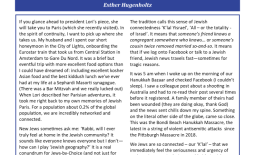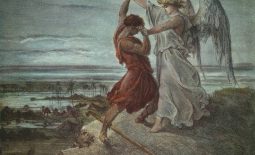On the Cusp of History
The personal dramas of the Patriarchs and Matriarchs have always played out on the stage of historical change and in this sense, their lives are no different from our own. When Abraham left the city of Ur, following the call of an anonymous and invisible God, he left behind a vibrant, dynamic and familiar way of life. Abram and Sarai were people of power and privilege, a prince and princess in their own right, who cast their lives aside in pursuit of a new, bold, transformative idea. When Isaac survived his binding on Mount Moriah, it is easy to forget that he was not just a victim of circumstance but that he too existed on the cusp of societal change. Isaac negotiated with kings and navigated famine. Then there is Jacob, of course, a traveler par excellence, journeying from Canaan back to Babylonia, building his own tribe along the way. Through the fated actions of Joseph, he finds himself making one final journey to Egypt, seeking reunification and reconciliation with his sons. This journey, of course, is not an isolated incident. As his life draws to a close, he has witnessed seismic changes in both Canaanite and Egyptian society. It is his young son, the multitalented Joseph, who has steered his adopted homeland through a series of national reforms, and history will have to be the judge whether these were enacted for good or ill; for the saving of human life or for the appropriating of livelihood, generating a new class of Egyptian serfs, ‘avadim l’faro’, ‘servants or slaves to Pharaoh’, a poignant foreshadowing that we can all intuit.
It is very tempting to look at Jacob’s blessings out of context. As Jacob blesses his sons in complex ways, we often zoom in on the family dynamic between father and children. We analyse each child’s character and anticipate each child’s destiny. We admire how Jacob, after a long and tumultuous life, is consciously setting his affairs in order and it is no surprise that this story has often formed the basis of discussing the ancient Jewish practice of ‘ethical wills.’ Confronting our mortality, taking stock and making the necessary arrangements are the hallmarks of a mature human being, and this past year has been a harsh teacher of this lesson.
However, just as it would be erroneous to ignore the personally transformative implications of Jacob’s relationships to his sons, it would be equally erroneous to ignore the context of Jacob’s ‘silver days.’ Firstly, during the opening of the Parashah, we learn that he spent 17 years in Egypt—a not insignificant timespan. We can imagine his ‘retirement’ being spent in opulence and luxury, at the Egyptian court where his son holds high office. We are left wondering how his unexpected high status in an urbanized culture might have affected this pastoralist and farmer from the Levant. We know from the previous portion, that Jacob reflected wistfully, perhaps mournfully, upon his life when Pharaoh inquired into his age: ‘shanah me’at v’ra’im hayu’ – ‘few and hard have the years of my life been’, he remarks (Gen. 47:9). We know from last week’s portion that the Egyptians disdained shepherds, even when allowed Jacob’s family to settle in the land of Goshen, prime land for their pastoralist endeavors, and that it was tempting for the brothers to obfuscate their true profession. Yet Jacob does not; he holds fast to who he is and does not relinquish his past, to the extent that he insists on being buried in Canaan.
Even the blessing of his children bears testimony to his constancy. It seems paradoxical that this shape-shifting trickster of yore has become a stabilizing presence; the cornerstone of his emerging tribe. He does not make excuses for his children’s flaws; does not gloss over their errors and consign them to the mists of time. Shimon and Levi are held to full account, as is Reuben. While his eyes may have dimmed; his keen intuition has not. Jacob is a man who lives on the cusp of time and change; he is aware of the shifting sands of history and knows that only unshakable integrity can meet the moment. When nations rise and empires fall; when famine ties knots in empty stomachs and when plagues lay waste to the strong and weak alike, when battles stir and potentates rally, it is only the unshakable foundation of the human spirit that will ground us.
In this sense, Jacob’s character does not only shape the relationship with his past, but helps to prepare his people for their future. Jacob’s blessings are not just reflections but foreshadowing of what is to come. At this time where Israel is poised to move from the story of a family into the annals of nation-building, we can take lessons from how steadfast the former trickster has become.
As we reflect and take stock of this secular New Year which has more Rosh haShanah-like overtones than most secular New Years, we too find ourselves in Jacob’s shoes. We are confronted with the limitations of our mortality as we witness unspeakable numbers of death in our nation. We bear witness to momentous political and socio-economic shifts, from one government administration to the next. We too grapple with famine and plague; not for lack of resources but through the cruelty of unjust distribution thereof. We see both the dispossession and the dispossessed. We live with the experience of the pandemic having upended our lives from the minute to the cosmic, from how we sanitize our groceries to how we contemplate the fate of our planet.
What brings us comfort, then, is not the turning away from truth, the ignoring of fact or the mere privilege of tuning out the windswept forces of history. For all his deception, Jacob was a strangely honest man; honest to a fault till the bitter end. He ultimately was not intimidated by power or swayed by riches. The God Who appeared to him at Luz was his constant; the gift of covenant to his sons, including Joseph, would become Joseph’s moral compass in a strange land. The gifts of Jacob’s blessings is that he teaches us how to live on the cusp of history and how to face the future with confidence, even when not yet knowing what may be.
As for me, I have found great comfort in the constancy of my Jewish values; in the torat chayyim, the Torah of Life, that continues to guide me through this pandemic. I have found solace in the eternity of Jewish ritual and practice, anchoring me in time and presence when all seems so unmoored. I have found deep truth in the great sweep of Jewish history and in the wrestling with our God, knowing that no matter what rises or falls, what changes or remains the same—we are part of the family of Israel, who showed us how to meet history with covenant.
Wishing you all a happy and healthy secular New Year, filled with moral courage and constancy, as well as health, hope and God’s abiding love.




